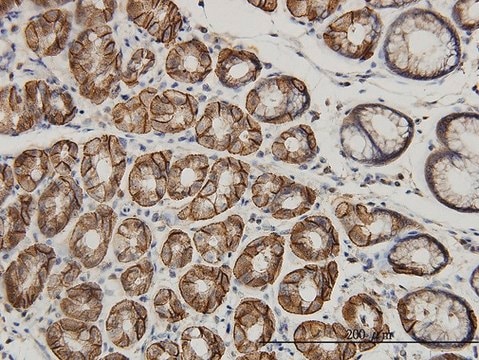MABN1805
Anti-alpha-Synuclein Antibody, clone 9C4
clone 9C4, from mouse
Synonyme(s) :
Non-A beta component of AD amyloid, Non-A4 component of amyloid precursor, NACP
About This Item
Produits recommandés
Source biologique
mouse
Forme d'anticorps
purified antibody
Type de produit anticorps
primary antibodies
Clone
9C4, monoclonal
Espèces réactives
human
Technique(s)
immunohistochemistry: suitable (paraffin)
western blot: suitable
Isotype
IgG1κ
Numéro d'accès NCBI
Numéro d'accès UniProt
Conditions d'expédition
ambient
Modification post-traductionnelle de la cible
unmodified
Informations sur le gène
human ... SNCA(6622)
Description générale
Spécificité
Immunogène
Application
Neuroscience
Qualité
Western Blotting Analysis: 0.5 µg/mL of this antibody detected alpha synuclein in 10 µg of human fetal brain tissue lysate.
Description de la cible
Forme physique
Stockage et stabilité
Autres remarques
Clause de non-responsabilité
Not finding the right product?
Try our Outil de sélection de produits.
En option
Code de la classe de stockage
12 - Non Combustible Liquids
Classe de danger pour l'eau (WGK)
WGK 1
Point d'éclair (°F)
Not applicable
Point d'éclair (°C)
Not applicable
Certificats d'analyse (COA)
Recherchez un Certificats d'analyse (COA) en saisissant le numéro de lot du produit. Les numéros de lot figurent sur l'étiquette du produit après les mots "Lot" ou "Batch".
Déjà en possession de ce produit ?
Retrouvez la documentation relative aux produits que vous avez récemment achetés dans la Bibliothèque de documents.
Notre équipe de scientifiques dispose d'une expérience dans tous les secteurs de la recherche, notamment en sciences de la vie, science des matériaux, synthèse chimique, chromatographie, analyse et dans de nombreux autres domaines..
Contacter notre Service technique







